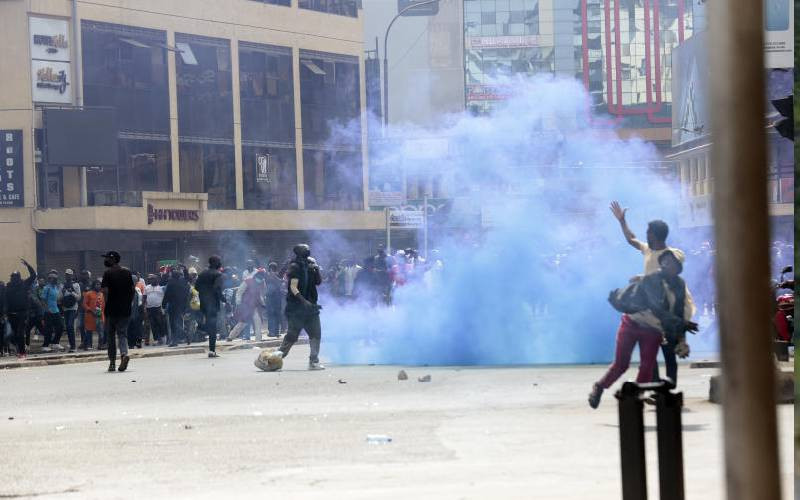Gen Z protest aftermath destruction in Nairobi CBD on June 26, 2025 [Boniface Okendo, Standard]
Several victims’ families, human rights defenders, netizens and bots this week focused on holding the advisory Panel of Experts on compensation for victims of brutal protest policing legally accountable. Their call is clear.
Reparations must be swift, transparent and anchored in our constitutional commission and independent offices. It also must not undermine criminal responsibility for state violence.
A newly released report strengthens the case for urgent criminal justice reforms to prevent and respond to police related deaths and trauma. The International Justice Mission (IJM) Justice System Response to Police Accountability report was publicly released this week. The 128-page report is a must-read for anyone seeking to understand the deeper struggles faced by victims’ families beyond viral posts, simplistic soundbites and headlines.
Follow The Standard
channel
on WhatsApp
A year’s research listening to 5,700 households, focus group discussions and key informants across Kiambu, Nakuru, Uasin Gishu, Machakos, Kisumu, Kakamega, Nairobi, Mombasa and Garissa counties have found a staggering 43 per cent of Kenyans have directly experienced police abuse.
Identity based profiling is rife. It is urban male youth, aged 25-34, and working in the informal sector who are being disproportionately targeted for extortion and harassment. Apart from them, human rights defenders, Muslims and Cushitic groups, people with tattoos, piercings and dreadlocks are also primary targets for police misconduct. Why do police raids and abuse peak on weekend evenings? Perhaps it is because nothing says ‘community policing’ more than the thrill of locking people up in time to ruin their weekend plans and a few bribes cover overtime. “Kamata Kamata Fridays” isn’t just a threat. It is a business model. As worrying as this business model, is the finding that a staggering two out of three Kenyans have witnessed police abuse. On the surface, the report finding that 63.7 per cent say they are willing to report police misconduct to police stations seems encouraging. However, only 37.4 per cent did this when faced with a crime committed against them by a police officer. Trust levels are higher with the Judiciary (53.1 per cent) and Independent Policing Oversight Authority (51 per cent).
The levels dip considerably with the National Police Service (10.2 per cent) and Directorate of Criminal Intelligence (14.3 per cent) with chiefs and community leaders coming much lower. The deep trust deficit revealed in this study may help explain the recent surge in criminal gangs and mob violence in Nairobi and Mombasa.
Kenyans feel IPOA investigations are underfunded and hampered by police non-cooperation. Witness and victim protection systems are inaccessible and inadequate. While significantly improved, the Judiciary takes more than three years to conclude cases and convictions are rare. The decision to charge is too over-centralised at the Office of the Director of Public Prosecutions and prone to abuse. There is virtually no psychosocial support or trauma-informed aftercare. Currently, the system is failing to deliver justice, adequate restoration or compensation to victims. While a stunning indictment of the justice system, there are several recommendations that could press through the injustices Kenyans are experiencing. Human rights-based and ethical police vetting, training and clear administrative and legal consequences for criminal activity would make a difference. More public education and community engagements are urgently needed.
Digital reporting, increased funding for oversight agencies and stronger coordination between justice agencies and civic organisations would help. While the report was conducted before the Panel of Experts to Compensate victims of violent protest policing (2017-2025) was announced in August, its recommendation to operationalise the Victims Protection Trust Fund remains valid. Five years ago, one in two Kenyans told Amnesty International Kenya they feared the police more than poverty. Two years ago, the Kenya police was ranked 114 out of 125 in the World Internal Security and Police Index. This recent season of protest-related violence and a paralysed justice system has shaken even the most hardened of citizens. For them and state officers who remain committed to building human rights policing, professionalism and public trust across the justice sector, the IJM report offers practical insights for reform.
[email protected]
Follow The Standard
channel
on WhatsApp
By Irungu Houghton
